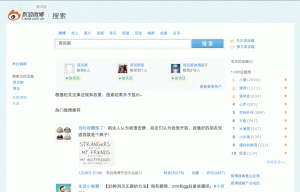Egypt: Protesters move from euphoria to fury
 Anger in Tahir Square as President Mubarak refuses to stand down, Index on Censorship’s Egypt regional editor Ashraf Khalil reports (more…)
Anger in Tahir Square as President Mubarak refuses to stand down, Index on Censorship’s Egypt regional editor Ashraf Khalil reports (more…)
 Anger in Tahir Square as President Mubarak refuses to stand down, Index on Censorship’s Egypt regional editor Ashraf Khalil reports (more…)
Anger in Tahir Square as President Mubarak refuses to stand down, Index on Censorship’s Egypt regional editor Ashraf Khalil reports (more…)
Terms like Falun Gong, the Tiananmen Square Massacre and the names of high profile Chinese dissidents have long been censored in China, but now it’s the turn of country names.
 A search on Weibo — a twitter-like service owned by Sina — for the words “Egypt” or “Tunisia” in Chinese returns the message: “According to relevant laws, regulations and policies, the search results cannot be shown.” The names of the countries in English are not blocked.
A search on Weibo — a twitter-like service owned by Sina — for the words “Egypt” or “Tunisia” in Chinese returns the message: “According to relevant laws, regulations and policies, the search results cannot be shown.” The names of the countries in English are not blocked.
News wires are reporting that Sohu’s microblog has also blocked searches for Egypt.
The state news services, though, are covering the protests in both countries and regular searches on online Chinese search engines are not blocking the words.
This new and curious development follows recent anti-government protests in both countries. Riots in major Egyptian cities including Cairo and Alexandria have left more than 100 people dead. The unrest in Tunisia toppled the president. Protests are continuing over the choice of ministers for the interim government.
Global Voices Online is reporting that some Chinese bloggers have set up regular updates of Egyptian news on Weibo which comes up in searches for “Egypt” in English.
The censorship all seems a bit over the top. As one China-based western blogger observed: “Anything is possible, I suppose, but the very idea of Chinese activists being so inspired by the riots in Egypt that they’d try to implement the same tactics in China is so absurd it’s laughable.”
 Index on Censorship is gravely concerned at the loss of life and injury to protesters on the sixth day of the popular uprising in Egypt. According to the most recent reports, at least 100 people have died and thousands have been injured since the protests against President Mubarak’s regime began last Tuesday.
Index on Censorship is gravely concerned at the loss of life and injury to protesters on the sixth day of the popular uprising in Egypt. According to the most recent reports, at least 100 people have died and thousands have been injured since the protests against President Mubarak’s regime began last Tuesday.
The Egyptian people have lived under emergency laws for 30 years, with their rights to freedom of expression and assembly constrained. The mass protests across the country are an unprecedented demand for political reform and social justice, without parallel in the recent history of the country. We urge President Mubarak to restrain from using force and to respond to the Egyptian people’s demands with long overdue reform.
Index in Censorship also condemns attempts to control and disrupt the media and electronic communication. The government closed down al Jazeera’s broadcasts in Egypt today and has severed internet access. This is a move to deprive the Egyptian public of vital information and the ability to communicate with each other. Index would remind President Mubarak that Egypt’s own constitution guarantees the right to freedom of expression and assembly, and request that he lift the state of emergency that stands in the way of all democratic reform as a matter of urgency.

Despite the information shutdown in Egypt, Index on Censorship’s Egypt regional editor Ashraf Khalil has filed this exclusive report from today’s anti-government protests in Cairo
(more…)